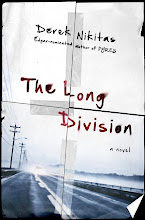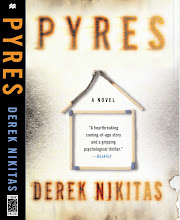I know some speed readers. My pal and fellow writer J.T. Ellison says she “can get 10-15 pages into a book in two minutes.” Critic extraordinaire Sarah Weinman is a staggeringly speedy reader. She claims to be able to take in information a paragraph or even a page at a time, sort of like looking at a picture. It has something to do with excellent peripheral vision, to hear her tell it.
Which explains why I can’t read more than a page a minute, tops. Shitty eyesight. Yeah, I’m envious of those who can read faster. Sure as hell could get a lot more reading done, and they may in fact have some kind of wiring in their brains that I don't have.
I don't presume to be able to understand the speed reading process and how it works, and I certainly don't doubt the insights my speed-reading friends gain from their reading. But I have to wonder two things. First, it’s got to be more than just the ability to see better, or wider, or more comprehensively in one swoop. There’s more to real reading than just seeing the words clearly. Second, I must wonder if speed readers end up missing something in the rush--if only because I know I would miss lots of stuff if I read any faster than I do. The point of all this could be only that I'm just kind of slow.
Truth told, I read different material at different rates. Straightforward informational nonfiction goes fastest, since all you’re getting is that: information. Of course, the more difficult the information, the more it needs analysis and interpretation and configuration from the reader, the slower I get. Can anyone read the great philosophers at a steady clip and get anything out of it?
Fiction written in a utilitarian, storyteller’s voice, like Dean Koontz or Stephen King, I can read that pretty fast. I raced through the last three books in King’s massive Dark Tower series, each one in a couple days. The prose is the opposite of dense: breezy, detail-lite passages that race the reader through activity and dialogue. There's often a lot of telling, where the imaginative work is done for you. I'm not knocking this stuff; it's a lot of fun to read and a great diversion.
But what about the more “writerly” fiction? Or fiction written in a time when the reading public preferred denser or more baroque prose, or spoke in an earlier form of English difficult for contemporary readers to translate? What happens to reading speed when meaning gets complicated by compound-complex sentencing, or inversions in syntax, or unfamiliar diction, or complexity, obscurity, or downright evasion or elusiveness?
Here’s the first sentence of George Eliot’s Middlemarch:
“Who that cares much to know the history of man, and how the mysterious mixture behaves under the varying experiments of Time, has not dwelt, at least briefly, on the life of Saint Theresa, has not smiled with some gentleness at the thought of the little girl walking forth one morning hand-in-hand with her still smaller brother, to go and seek martyrdom in the country of the Moors?”
At the risk of exposing my own stupidity, I’m going to admit this is a tough sentence for me. Slow-going. I have to read this sentence a phrase at a time, a couple times, just to see its whole meaning play out. Like: to realize that the person who “has not dwelt” and “has not smiled” is the “Who” at the beginning of the sentence. Like: realizing this is a rhetorical sentence: “What thoughtful person hasn’t thought about Saint Theresa?” (me, for one). Like: getting that the little girl is Saint Theresa herself. Like: getting that the “mysterious mixture” is “the history of man.” This is all slow-going grammatical analysis I have to undertake before I can even see what the sentence is asking of me, and appreciate the question.
It ain’t good enough to dismiss this prose as inconsequential old fashioned-ness, because we're talking about George Eliot, and she’s bigger than any of us. Her place in literary history is solid, and we’re not going to break it. It’s our job to step up to her, to Shakespeare, to Melville, to all of them. Yes, we can say that they're not our cup of tea or ignore them completely, but the more of us who dismiss the past masters, the more of our literary culture and history we kill off and bury forever.
Occasionally, we can dismiss contemporary writers who seem to be just difficult for the sake of difficulty. But we can’t rush to assume that a writer’s difficulty exists only for its own sake. Often, difficulty is a product of culture and time, or, perhaps most importantly, difficulty is a product of the complexity and depth of an author's expression. So we can’t just say: well, I don’t read books by authors who don’t write clearly or breezily. That’s just blanket stupidity.
Philosophy and poetry are even tougher. Try to speed-read Nietzsche or Walter Benjamin or W.B. Yeats. Unless you’re a genius, Speed Reader, you’re lost. Constantly, I have to convince my students to slow down when reading poetry. So often, you’ve got to unravel syntax and consider alternate meanings of words, and that’s even before you can comprehend the full meaning of a line or a stanza. Before you can get a full picture of the image evoked or a full understanding of the idea expressed, you've got to figure out what the sentence actually says.
Maybe those who claim to be speed readers aren’t talking about reading poetry and high philosophy. Few people these days notice when you omit those categories.
But, still. Fulfilling reading is about much, much more than the mere speed at which you process the English language in print. Most of us can read faster than we can comprehend what we’re reading. That’s obvious. But what’s not obvious is that reading is more than just comprehension, too. Just because we understand a sentence or paragraph of fiction, doesn’t mean we truly experience it.
Most of what I mean has to do with gaps—a Reader Response Theory word. Don’t worry—this isn’t technical. It’s just the idea that with fiction, the words on the page are only part of the equation. The words on the page are only a blueprint for the reader’s full experience, most of which the conscientious reader provides him or herself during the reading process.
Take for instance, a brief but arresting image I read recently in Dennis Tafoya’s debut crime novel Dope Thief. Paraphrased: the main character is scoping out a farm house, notices swing set chains, seats missing, pinging against the swing set frame. It’s one sentence, fairly nondescript, but it suggests a lot of gaps that need filling by me.
First, the image gaps. Good writers give “telling details,” details that suggest much more about the image that needs be said. The reader will fill in the rest. When I see the above image, I fill in, at least: the intensity of the breeze that’s swinging those chains, the frequency of the pinging, the rustiness of the swing set, the height of the neglected grasses surrounding the set. And much more that I'm only half-conscious of. I need time--seconds, at least--to do that imaginative work.
Next, the emotion gaps. I have to take a nanosecond, at least, to feel the forlorn mood of the image. I have to ponder why the narrator notices this image and what it means that he does. This is a guy who lost his childhood early, so the image has thematic resonance. The missing swings on the dangling chains are metaphors, but you have to think about what they're metaphors for.
Do I really go through all this work when I read a narrative sentence? Yes. In order to create the movie in my mind, not to mention the emotional depth in my understanding, I have to. It takes only mere seconds to do so, but that’s mere seconds per sentence, which adds up to two or three minutes a page, minimum. Get a denser, more difficult writer like Nabokov or Cormac McCarthy in his earlier books, you're looking at five minutes a page.
So when I hear about speed readers I wonder if I’m not just a damn slow thinker, or if so-called speed readers are really actually denying themselves the full intensity and depth of a reading experience. If you read so fast you don’t fill those gaps, the book stays a hazy blueprint, just a shallow simulation of a full experience. And what fun is that?



No comments:
Post a Comment